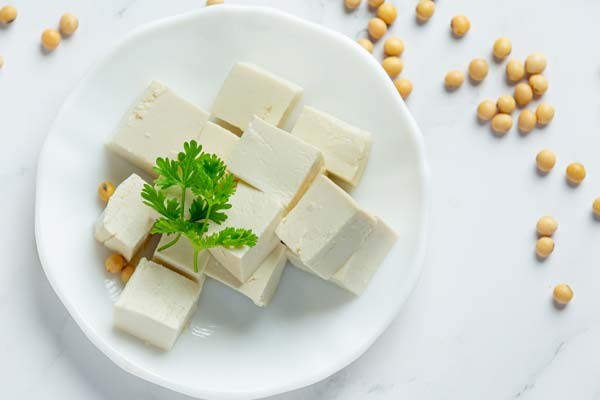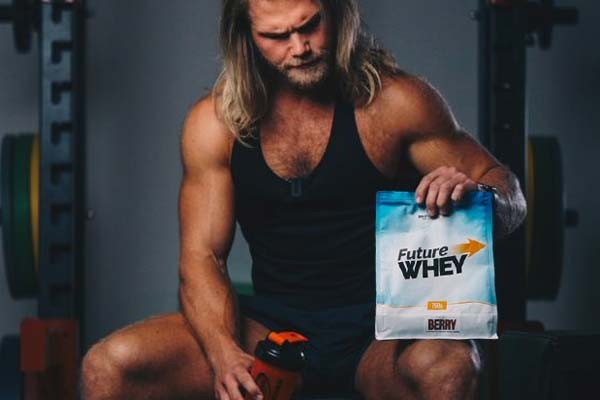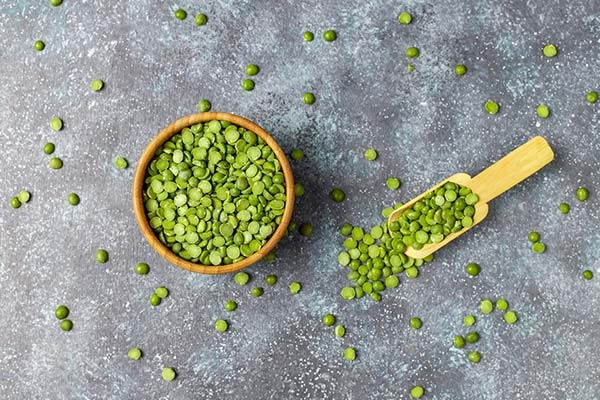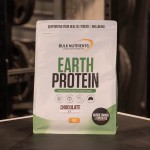Can I Still Grow Muscle at the Same Rate on a Vegan Diet?

What to eat to grow muscle on a vegan diet
Muscle growth effectively comes down to adequate levels of protein intake and good quality protein at that. For vegans, this can be a challenge because their protein comes from plant-based protein sources that are simply lower in protein when compared to an omnivorous diet. Take a look at the table below for a clear example:
| Meat protein | ||
|---|---|---|
| Meat | Chicken breast (grilled without skin) | 32.0 |
| Beef steak (lean grilled) | 31.0 | |
| Lamb chop (lean grilled) | 29.2 | |
| Pork chop (lean grilled) | 31.6 | |
| Fish | Tuna (canned in brine) | 23.5 |
| Mackerel (grilled) | 20.8 | |
| Salmon (grilled) | 24.2 | |
| Cod (grilled) | 20.8 | |
| Seafood | Prawns | 22.6 |
| Mussels | 16.7 | |
| Crabsticks | 10.0 | |
| Eggs | Chicken eggs | 12.5 |
| Dairy | Whole milk | 3.3 |
| Semi-skimmed milk | 3.4 | |
| Skimmed milk | 3.4 | |
| Cheddar cheese | 25.4 | |
| Half-fat cheddar | 32.7 | |
| Cottage cheese | 12.6 | |
| Whole milk yogurt | 5.7 | |
| Low fat yogurt (plain) | 4.8 | |
| Plant Protein | ||
| Pulses | Red lentils | 7.6 |
| Chickpeas | 8.4 | |
| Beans | Kidney beans | 6.9 |
| Baked beans | 5.2 | |
| Tofu (soya bean steamed) | 8.1 | |
| Grains | Wheat flour (brown) | 12.6 |
| Bread (brown) | 7.9 | |
| Bread (white) | 7.9 | |
| Rice (easy cook boiled) | 2.6 | |
| Oatmeal | 11.2 | |
| Pasta (fresh cooked) | 6.6 | |
| Nuts | Almonds | 21.1 |
| Walnuts | 14.7 | |
| Hazelnuts | 14.1 |
Source: British Nutrition Foundation.
You can see how plant proteins yield significantly less protein.
With current recommendations to consume 1.7 grams - 2.6 grams of protein per kilogram of body weight per day for optimal muscle growth, it can be difficult for vegans.
Moreover, it's recommended that vegans eat on the larger side of this number, as plant protein isn't as rich in the muscle-building amino acid leucine; one of the three BCAAs. This is a very critical component to a vegan looking to grow muscle; without eating adequate leucine you're leaving potential muscle gains on the floor. And this is what puts you at risk of not growing muscle at the same rate on a vegan diet.

Muscle building plans for vegans: How to get enough protein and leucine from plant sources
Omnivores have it easy: they can sleep-walk and still get adequate protein and leucine levels by eating standard servings of chicken, eggs, and any other animal products during the day.
But for vegans, plant proteins are also lower in leucine and are less digestible than animal proteins.
So how is this overcome? Vegans must consume the right food and supplements high in leucine:
| Food | Protein per 100 g |
|---|---|
| Pumpkin seeds (dried, uncooked) | 30.2 |
| Lentils (red, split, uncooked) | 24.6 |
| Black beans (uncooked) | 21.6 |
| Almonds (raw) | 21.2 |
| Tempeh | 20.3 |
| Tofu (calcium set) | 17.3 |
| Oats (rolled) | 16.9 |
| Quinoa (uncooked) | 14.1 |
Table adapted from Rogerson, 2017.
We've catered for vegans passionately here at Bulk Nutrients, with two supplements to put an end to any protein and leucine concerns!
Vegan bodybuilding: The best vegan supplements for muscle growth
Here are two of our biggest weapons:
- Our Bulk Nutrients Future Whey protein powder -- contains 22 grams of protein and 3.4 grams of leucine! (flavours: berry, cola, and lemonade).
- Our Bulk Nutrients BCAAs -- boasting 2.5 grams of leucine a serve.
To ensure you're gaining as much muscle as possible, current leucine recommendations for everybody is approximately 40-45 mg per kilogram of body weight per day. For someone who weighs 70 kilograms, this would be 3.2 grams of leucine a day.

And here's a potential issue: scientists still haven't decided how much leucine those of us who exercise need, so that's why it's better to eat on the higher side (maybe 6 grams or more) just to be safe. Again, this is where omnivores have the upper hand.
Let's take the example of Bulk Nutrients customer Natasha, a vegan who weighs 68 kilograms:
Protein requirements: 2 grams of protein x 68 kilograms = 136 grams
Leucine requirements: 45 mg x 68 kilograms = 3 grams of leucine (double to be safe = 6 grams of leucine).
So with the use of the aforementioned supplements and foods above, Natasha can get enough protein and leucine for muscle growth. And here's the second piece of good news for vegans: there's no evidence to suggest a nutritionally balanced vegan diet hinders athletic performance.
Vegan protein vs animal protein: how do they compare?
Many studies have examined this directly, here are some of the findings:
- Whey protein is effective at muscle growth and recovery in healthy gym-goers, with improvements seen in under 30 grams post-workout. But results with that dosage is more difficult and inconsistent with plant protein powders. But taking 40 grams of plant proteins "can provide similar fitness outcomes to those achieved with whey protein." Lesson: more plant protein might be better.
- In another study comparing 75 grams of whey or rice protein in elite martial artists, there was no difference in body composition outcomes. Lesson: more plant protein might be better.
- With 43% of whey protein compromising of essential amino acids and pea protein being 30%, another study gave two groups of subjects 25 grams of pea protein twice a day and the other the same in whey protein. The males, aged 18-35, trained biceps for 12 weeks, with the pea protein was found to increase biceps just as much as they whey. However, it should be noted that the protein they consumed outside of this study wasn't monitored, so we don't know how much extra leucine and protein those in the pea group were getting away from their 50 grams of pea protein twice a day. Lesson: more plant protein might be better.

However, pea protein is still high in leucine: 100 grams of whey protein and pea protein will give you 8.6 grams and 6.4 grams of leucine respectively, making it a terrific option for muscle-seeking vegans.
The safest way to ensure maximal growth for vegans might be to take 1 and a half servings of pea protein. We've created our own great-tasting pea protein here at Bulk Nutrients used by many vegan customers looking to maximise muscle size.
It boils down to this: vegans might want to consume 20-30% extra protein a day in line with current recommendations. They must pay special attention to getting enough leucine via food and supplements, such as pea protein, BCAAs, and vegan whey protein options just like our "Future Whey" product. If appropriate attention is paid to adequate protein and leucine requirements, then vegans should be able to grow muscle at the same rate.

Dayne Hudson
Like many, Dayne was once desperate to lose weight and get into shape. But everyone he asked, everything he read, lead to the same place... nowhere.
His journey started there - researching science journals and completing a Sports Nutrition Specialist qualification so he could make weight loss easier.
References:
- Helms ER, Aragon AA, Fitschen PJ. Evidence-based recommendations for natural bodybuilding contest preparation: nutrition and supplementation. J Int Soc Sports Nutr. 2014 May 12;11:20. doi: 10.1186/1550-2783-11-20. PMID: 24864135; PMCID: PMC4033492.
- van Vliet S, Burd NA, van Loon LJ. The Skeletal Muscle Anabolic Response to Plant- versus Animal-Based Protein Consumption. J Nutr. 2015 Sep;145(9):1981-91. doi: 10.3945/jn.114.204305. Epub 2015 Jul 29. PMID: 26224750.
- Tipton KD, Wolfe RR. Protein and amino acids for athletes. J Sports Sci. 2004 Jan;22(1):65-79. doi: 10.1080/0264041031000140554. PMID: 14971434.
- Górska-Warsewicz H, Laskowski W, Kulykovets O, Kudlińska-Chylak A, Czeczotko M, Rejman K. Food Products as Sources of Protein and Amino Acids-The Case of Poland. Nutrients. 2018;10(12):1977. Published 2018 Dec 13. doi:10.3390/nu10121977
- FAO . Dietary Protein Evaluation in Human Nutrition: Report of an FAO Expert Consultation 2011. FAO; Rome, Italy: 2013. FAO Food and Nutrition Paper 92.
- Hertzler SR, Lieblein-Boff JC, Weiler M, Allgeier C. Plant Proteins: Assessing Their Nutritional Quality and Effects on Health and Physical Function. Nutrients. 2020;12(12):3704. Published 2020 Nov 30. doi:10.3390/nu12123704
- Mero A. Leucine supplementation and intensive training. Sports Med. 1999 Jun;27(6):347-58. doi: 10.2165/00007256-199927060-00001. PMID: 10418071.
- Rogerson D. Vegan diets: practical advice for athletes and exercisers. J Int Soc Sports Nutr. 2017;14:36. Published 2017 Sep 13. doi:10.1186/s12970-017-0192-9
- Wirnitzer, K. et al. 2018. Health Status of Female and Male Vegetarian and Vegan Endurance Runners Compared to Omnivores—Results from the NURMI Study (Step 2). Nutrients 11(1):29 doi: 10.3390/nu11010029.
- Stokes T, Hector AJ, Morton RW, McGlory C, Phillips SM. Recent Perspectives Regarding the Role of Dietary Protein for the Promotion of Muscle Hypertrophy with Resistance Exercise Training. Nutrients. 2018;10(2):180. Published 2018 Feb 7. doi:10.3390/nu10020180
- Kalman D., Escalante A., Hewlings S.J., Willoughby D.S. The body composition effects of extra protein in elite mixed martial artists undergoing frequent training over a six-week period. EC Nutr. 2018;13:6.
- Volek J.S., Volk B.M., Gomez A.L., Kunces L.J., Kupchak B.R., Freidenreich D.J., Aristizabal J.C., Saenz C., Dunn-Lewis C., Ballard K.D., et al. Whey protein supplementation during resistance training augments lean body mass. J. Am. Coll. Nutr. 2013;32:122–135. doi: 10.1080/07315724.2013.793580.






























